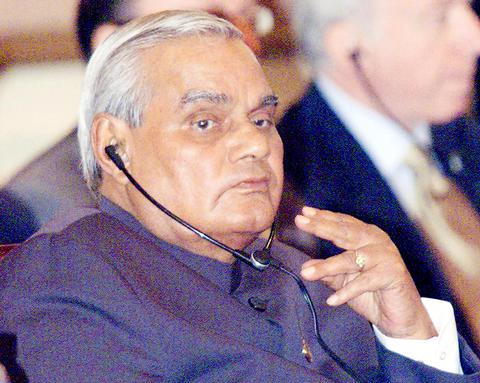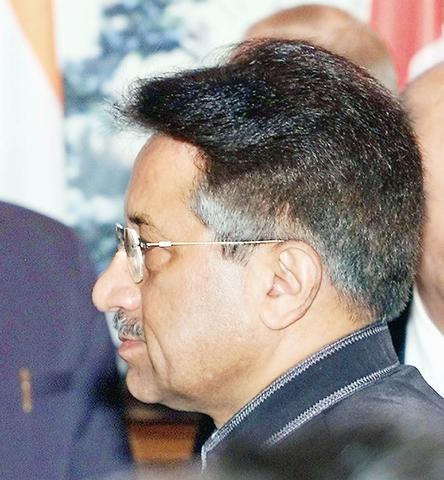The leaders of India and Pakistan blamed each other in angry statements yesterday for 55 years of conflict as they sat at the same table while their troops fired at each other in disputed Kashmir.
Russia and China pressed India and Pakistan to enter face-to-face talks to prevent the Kashmir conflict from exploding into a fourth full-scale war between the nuclear-armed neighbors.

PHOTO: AP
But from the tone of the Pakistani and Indian leaders' remarks during a 2 1/2-hour session at an Asian security summit, dialogue appeared even more remote.

PHOTO: AP
Russian President Vladimir Putin, hoping to act as an international peacemaker, held separate one-on-one meetings with both Pakistani President General Pervez Musharraf and India's Prime Minister Atal Bihari Vajpayee -- but there was no sign by the end of the day that the Musharraf and Vajpayee would hold their own talks.
Indian and Pakistani soldiers unleashed fresh artillery and gunfire at each other in Kashmir yesterday. There were no immediate reports of casualties, but eight civilians died in shelling Monday.
"We do not want war. If war is imposed on us, we will defend ourselves with the utmost resolution," Musharraf said, sitting about 5m across from the Indian leader at a rectangular, U-shaped table in the Kazakh city of Almaty.
"The people of South Asia continue to pay a heavy price for the refusal by India to resolve the Kashmir dispute in accordance with resolutions of the United Nations and the wishes of the Kashmiri people."
Vajpayee accused Pakistan of trying to use nuclear blackmail and rejected Musharraf's repeated assurance that "Pakistan will not allow its territory to be used for any terrorist attacks outside or inside its boundaries."
Vajpayee said violence in India's portion of Kashmir and infiltration of Islamic militants from Pakistani territory had not decreased since Musharraf first made that assurance Jan. 12.
"We have seen in the following months that cross-border infiltration has increased, violence in Jammu and Kashmir has continued unabated and terrorist camps continue to operate unhindered across our borders," Vajpayee said.
"We have repeatedly said that we are willing to discuss all issues with Pakistan, including Jammu and Kashmir," Vajpayee said. "But for that, cross-border terrorism has to end."
"Nuclear powers should not use nuclear blackmail," Vajpayee said. India has a policy of no first use of nuclear weapons in a conflict, but Pakistan, weaker in conventional arms and army size, has made no such vow.
Vajpayee and Musharraf both sat with pursed lips and stony stares as the other spoke.
With the 14 other delegates, they signed a declaration condemning "all forms and manifestations of terrorism" and promising "to strengthen cooperation and dialogue."
When delegates mingled and greeted each other as the conference ended, the two stood on opposite sides of the room and did not interact.
Vajpayee and Musharraf were meeting separately with several of the leaders at the summit, including Russian President Vladimir Putin and Chinese President Jiang Zemin (
"We cannot but be concerned about the explosive situation in the relations between Pakistan and India, which threatens to destabilize the situation in the whole Eurasian continent," Putin said at the summit, adding that world leaders would make every effort to defuse the crisis.
He then put a positive spin on the acerbic Musharraf-Vajpayee exchange, perhaps trying to drum up optimism for his mediation efforts.
"In the speeches of both leaders we can hear a readiness for dialogue," Putin said.
Putin seemed more comfortable during talks with Vajpayee, whom he met after Musharraf. Putin said he spoke often with the Indian leader and expressed Russia's concern about India's relationship with Pakistan.
However, Putin stressed that "we proceed from the assumption that one must do whatever it takes'' to settle the conflict and that to that end Musharraf had sent ``a series of serious and positive signals" during their talks. Putin did not elaborate.
Jiang urged those involved in regional conflicts to settle ``their disputes peacefully without delay.''
Musharraf said as he arrived in Almaty on Monday night he was ready for ``unconditional talks'' with Vajpayee.
The Indian leader insists that before any talks, he must see proof that Pakistan has withdrawn support from Islamic militants who have fought a 12-year insurgency for the independence of India's portion of Kashmir, or its merger with Pakistan.

The CIA has a message for Chinese government officials worried about their place in Chinese President Xi Jinping’s (習近平) government: Come work with us. The agency released two Mandarin-language videos on social media on Thursday inviting disgruntled officials to contact the CIA. The recruitment videos posted on YouTube and X racked up more than 5 million views combined in their first day. The outreach comes as CIA Director John Ratcliffe has vowed to boost the agency’s use of intelligence from human sources and its focus on China, which has recently targeted US officials with its own espionage operations. The videos are “aimed at

STEADFAST FRIEND: The bills encourage increased Taiwan-US engagement and address China’s distortion of UN Resolution 2758 to isolate Taiwan internationally The Presidential Office yesterday thanked the US House of Representatives for unanimously passing two Taiwan-related bills highlighting its solid support for Taiwan’s democracy and global participation, and for deepening bilateral relations. One of the bills, the Taiwan Assurance Implementation Act, requires the US Department of State to periodically review its guidelines for engagement with Taiwan, and report to the US Congress on the guidelines and plans to lift self-imposed limitations on US-Taiwan engagement. The other bill is the Taiwan International Solidarity Act, which clarifies that UN Resolution 2758 does not address the issue of the representation of Taiwan or its people in

US Indo-Pacific Commander Admiral Samuel Paparo on Friday expressed concern over the rate at which China is diversifying its military exercises, the Financial Times (FT) reported on Saturday. “The rates of change on the depth and breadth of their exercises is the one non-linear effect that I’ve seen in the last year that wakes me up at night or keeps me up at night,” Paparo was quoted by FT as saying while attending the annual Sedona Forum at the McCain Institute in Arizona. Paparo also expressed concern over the speed with which China was expanding its military. While the US

SHIFT: Taiwan’s better-than-expected first-quarter GDP and signs of weakness in the US have driven global capital back to emerging markets, the central bank head said The central bank yesterday blamed market speculation for the steep rise in the local currency, and urged exporters and financial institutions to stay calm and stop panic sell-offs to avoid hurting their own profitability. The nation’s top monetary policymaker said that it would step in, if necessary, to maintain order and stability in the foreign exchange market. The remarks came as the NT dollar yesterday closed up NT$0.919 to NT$30.145 against the US dollar in Taipei trading, after rising as high as NT$29.59 in intraday trading. The local currency has surged 5.85 percent against the greenback over the past two sessions, central